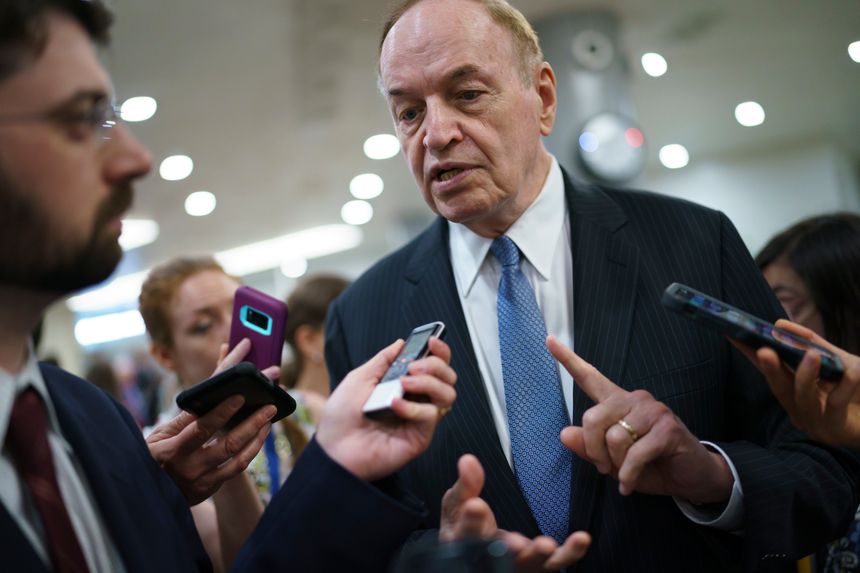A worrying new crypto broker definition and tax proposal made it into the U.S. Senate’s approved $1T Infrastructure Bill, despite vehement lobbying from both the industry and bipartisan criticism.
The future of a large section of the U.S. cryptocurrency industry is under threat and may now rely on the “goodwill” of US policymakers and tax authorities who have planted onerous new cryptocurrency regulations into the recently passed $1 trillion bipartisan Infrastructure Bill.
A worryingly broad new crypto broker definition could make life extremely difficult for cryptocurrency retail investors, miners, software developers, and validators of transactions. In fact, it could potentially force these entities out of the U.S. crypto market altogether and on to greener pastures. The definition was left unchanged after a disgruntled octogenarian senator scuppered a crypto-friendly amendment to it after days of deliberations.
While the Treasury has signaled that it will not enforce the definition on non-brokers, industry doubts remain.
With the bill now passed, it will be sent to the House of Representatives before it gets President Biden’s final signature, only one more chance remains to get the crypto broker definition changed.
Approved Bill Targets $28B More In Crypto Tax
The inclusion of stricter crypto transaction regulations is expected to generate roughly $28 billion in revenue to support the funding of the bill. It is important to note that this bill is bipartisan, as this usually signals that both parties and lawmakers agree on the spending and regulations, and wish to take home a win to their constituents.
The $1 trillion dollar bill was swept through the senate in a 69-30 vote, which includes Senate Minority Leader Mitch McConnell (R- Ken.), who had publicly announced his intention to stop the Biden agenda in the past. Included in the 2000-page bill are a variety of expenses, such as $73 million to restore the nation’s electrical grid, and $1 billion to aid in the restoration of the Great Lakes. The bill was also passed with a partisan budget resolution that approves $3.5 trillion more dollars in spending for Medicare, tax credits, and climate initiatives.
So this begs the question, what do infrastructure and Medicare have to do with cryptocurrency and decentralized finance? Well, in need of additional funding post-stimulus, and realizing they are holding almost all of the cards, the US Senate wishes to revisit tax reporting on cryptocurrency gains and transactions.
The Crypto Broker Controversy
Section 80603 of the bill creates an ambiguous definition of the word “broker” that some senators claim not only includes actual brokers, but non-broking parties such as DeFi software developers, miners, nodes, and transaction validators.
In traditional, centralized finance, brokers act as an intermediary between security exchanges and investors. They must also register with the Securities and Exchange Commission (SEC) and with Finra.
What is required from crypto brokers under the new bill?
While taxation and reporting of capital gains are not new for crypto investors, defining individual actors as “brokers” adds onerous additional responsibilities that will be nigh impossible for specifically most DeFi companies to deliver on, as they may have neither the tools nor resources to do so.
Firstly, the most difficult of these responsibilities is requiring all brokers (as defined in the infrastructure bill) to report all transactions of their customers on a form akin to the IRS’ 1099-B, thereby raising anonymity and privacy concerns.
Secondly, brokers are expected to add digital asset exchanges to form 8300, the paperwork required by the Internal Revenue Service (IRS) and the Financial Crimes Enforcement Network (FinCEN) when a purchase or trade is made that exceeds $10,000 dollars. There is no way to know yet if this anti-money laundering (AML) measure) also includes DeFi lending, such as smart contracts.
Sen. Shelby Shells “Compromise”, Despite Bipartisan Support
Not all Senate members were complicit in adding additional cryptocurrency legislation without considering its ramifications on the industry. Senators Cynthia Lummis (R-Wy.) Ron Wyden (D-Ore.) and Pat Toomey (R-Pa.) created an amendment to clarify and narrow down the definition of a broker. Ted Cruz (R.Tex.) took this one step further, lambasting many members of Congress in a viral speech for not knowing “what the hell a cryptocurrency even is.”
After days of deliberation, many senators agreed that tightly regulating cryptocurrency before it is sustainable enough to adopt is a bad idea, and therefore a compromising, carefully worded amendment to the original broker definition, considered favorable to the crypto industry, was put to the Senate for a vote, requiring a unanimous decision.
Unfortunately, 87-year old Senator Richard Shelby (R-Ala.) vetoed the proposal after his demands for an additional $50 billion for the military fell on deaf ears.

A vote to amend the infrastructure bill required all 100 sitting members to agree upon the change, and due to the Republican’s additional request, leading Democrat Bernie Sanders objected, and an agreement was not reached. The Senate passed the bill with the ambiguous, hastily written definition of “broker” unamended.
Crypto advocates and lobbyists will have one more attempt to raise concerns when the bill is taken up by the House of Representatives in September, and if passed, will be sent to President Joe Biden to be signed.
Can the Crypto Industry Effectively Fight Unreasonable Regulation?
Cryptocurrency exchanges have been under the global scrutiny of regulators since the Financial Action Task Force (FATF) adopted the so-called “Travel Rule” in June 2019, which requires virtual asset service providers (VASPs) to share compliant user data with counterparties.
Since then, U.S. regulators like FinCEN, CFTC, and the SEC have begun to turn their attention to the non-custodial reaches of the digital assets space, where innovation moves at a breakneck pace, such as the DeFi sector and unhosted wallets. In fairness though, legislators worldwide have been trying to close regulatory loopholes for the crypto industry. Most recently the European Commission proposed a massive and comprehensive new digital asset legislation bill, while the FATF is set to update their FATF Standards guidance on virtual assets and VASPs in November 2021.
By the beginning of August, the cryptocurrency lobby had spent $2.4 million dollars and is on track to double the funding for lobbying services spent last year. Coinbase, a US exchange firm, for example, spent $160,000 on lobbying so far this year. Ripple Labs, currently locked in a courtroom battle with the SEC, meanwhile has spent over half a million dollars toward lobbying on behalf of the cryptocurrency community.
Ripple has also hired Rosa Rios, a former U.S Treasurer, to join their board of directors as of May, while Binance.US employed former Acting Comptroller Brian Brooks (who has since resigned) and Fireblocks appointed ex-SEC chief and crypto skeptic Jay Clayton as an advisor.
Besides hiring former officials, crypto agencies have been heavily increasing their number of lobbyists, from a single member in 2016 to 60 lobbyists so far in 2021. Among these lobbyists are some funded by Bitcoin supporter Jack Dorsey’s Square, which reported the purchase of 3318 Bitcoins in 2021 Q1, and now accounts for 5% of Square’s liquid assets. Square spent $440,000 dollars on lobbying in Q2 of this year on behalf of the cryptocurrency sector.
These numbers and names are promising, however, it’s important to remember that the crypto industry is still developing and designing incentive structures to spur innovation and defend against regulatory overreach. This is something that traditional finance has been lobbying and developing for decades. For example, when including real estate and insurance, the finance sector spends a staggering $245 million dollars annually, the second-highest amount only to the health sector.
Crypto Industry Strikes Back
While it’s easy to feel discouraged considering how ill-equipped American politicians and legislatures are currently deciding the fate of crypto, and if it’s possible to continue abiding by the industry’s founding principles, such as data privacy and unfettered innovation, remember that not all change is done while wearing a suit and tie.
Since the passing of the $1 trillion dollar bill passed the Senate, advocacy groups such as Fight for the Future and the Electronic Frontier Foundation have aided in directing more than 40,000 phone calls to senators to address their votes on the bill. High-profile celebrities such as Ashton Kutcher and the aforementioned Jack Dorsey have also worked hard to bring attention to the issue on social media, while the Chamber of Digital Commerce vehemently opposed the new proposal.
What’s Next for the Crypto Broker Definition?
The fight for maintaining the rights of miners, software developers, validators, and the anonymity of cryptocurrency investors, is not over, as the bill has not yet passed the House. In fact, the battle may have only begun. Regardless of the outcome, on the plus side, there is obvious public and political support for the lighter regulation of cryptocurrency and blockchain technology in order to foster much-needed U.S. innovation.
Encouragingly, the Treasury has reportedly clarified that even if the original definition is passed, it will likely not be enforced to target non-broker like crypto brokers. The aim of the bill is to establish intent, rather than set rules in stone, and its regulations may have to be further developed and refined for years to come. Of course, this may do very little to alleviate the industry’s deep-seated distrust.
Therefore, this untenable situation in the U.S., where crypto is now used as a political playball instead of a tool for economic advancement, has helped to galvanize the response from crypto advocates. There can be little remaining doubt that blockchain and digital asset technology will define the future of global finance over the course of the 21st century, with countries from China to South Africa to El Salvador breaking new frontiers, leaving the United States, a 20th-century champion and pioneer of technological innovation, in limbo as it tries to impose largely outdated rules on a new asset class. While it may at times seem futile, it is vital that advocacy groups for both digital assets and technological freedom continue to call out obvious negligence when attempting to regulate with a broad brush.
Written by Werner Vermaak
(This article does not represent the opinions of CoolBitX and Sygna and should be considered for educational purposes only)


